Are you considering using 0.05mm 304 stainless steel foil in your application, but have some questions about its benefits and uses? Look no further, as we have compiled an FAQ to help answer your inquiries.
Are you in search of the highest quality 0.05mm 304 stainless steel foil? Look no further than Yaoyi Stainless Steel. We are a leading manufacturer of stainless steel foils with over 20 years of experience in the industry. Our top-notch stainless steel foils are widely used in a variety of industries, including electronics, medical, aerospace, and more.
At Yaoyi, we use only the finest quality materials and advanced production techniques to manufacture our 0.05mm 304 stainless steel foil. We offer a range of thicknesses, including 0.03mm and 0.02mm, as well as 316 stainless steel foil. Our stainless steel foils are made to your exact specifications and we can cut to any width you need.
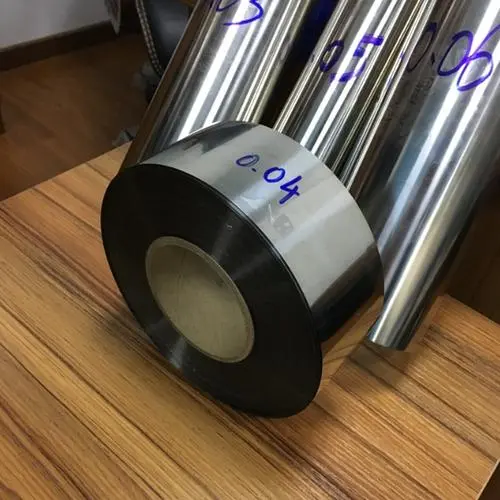
Besides the 0.05mm stainless steel foil, you may need to purchase other 304 stainless steel products from China, please contact us if you have any questions.
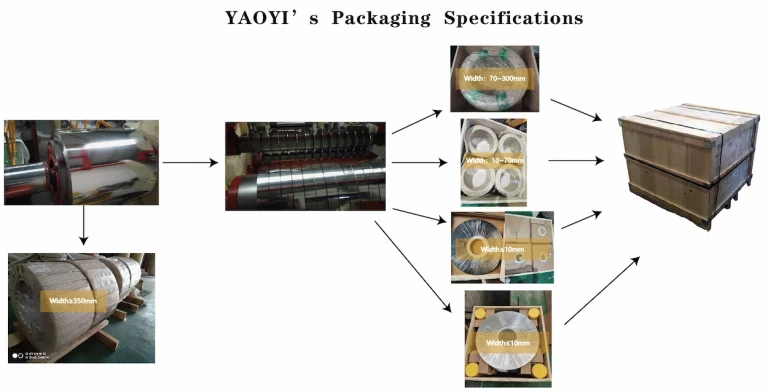
The market share of today’s large LCD color TVs competes with large plasma color TVs, starting with small portable TVs in the initial stage. In the beginning, the frame of the small mobile TV used a surface-treated steel plate. As the guide device (such as the car driving line guide device, etc.), the screen of the computer, the TV, and the like have become larger. The chance of contact between the operator’s hand and the cross-section of these product components increases, it exposing the shortcomings of the surface-treated steel plate rusted on the cut end surface. To cope with this shortcoming, home appliance manufacturers began to send out stainless steel to the stamping processing cooperation factory and negotiate with the stainless steel manufacturer. At that time, Matsushita Electric Industrial and Sanyo Electric had their stamping processing departments, while Sharp and other manufacturers needed to commission processing and cooperation.
After Sharp Corporation, a home appliance manufacturer, implemented stainless steel, Sanyo Electric, Matsushita Electric, and other manufacturers have adopted stainless steel one after another. In the beginning, the stamping processing department had the only experience in processing ordinary steel. When processing stainless steel, some shortcomings, such as severe mold wear and rust marks, were caused by powder.
The mobile phone is a product that integrates the outstanding achievements of electronic technological innovation. People used Various materials from the body (housing) to various parts. The body (shell) used aluminum or plastic because of the emphasis on lightweight and later changed to magnesium alloy to prevent scratches. In Europe and America, designers use stainless steel designs in mobile phones. The disc springs are used for the keys of resin or phosphor bronze. In consideration of lighter weight, corrosion resistance, and elasticity, stainless steel foils with a thickness of 0.02~0.07mm were popular. Yaoyi products 0.05mm SUS304 can be applied here. Due to mobile phones’ popularization, the number of times a button pressed has increased from 200,000 to 300,000 times to 3 million times. In consideration of high durability, stainless steel should be the right choice.
Almost all lithium-ion battery cases are using stainless steel, and aluminum products have recently started to compete (see the description in the “Battery Case” chapter for details). As mobile phones enter the 3G era, stainless steel is a shielding plate for 3G mobile phones. Taking into account the shielding of electromagnetic waves and magnetic lines of force, the representative steel type SUS304 of ferritic stainless steel with a plate thickness of 0.15 to 0.25 mm is used to make a case that prevents noise interference, shields electromagnetic and lithium-ion batteries.
(1) “Ingenuity” (design and conception);
(2) Strength and flexibility;
(3) Magnetic shielding and electromagnetic wave shielding.
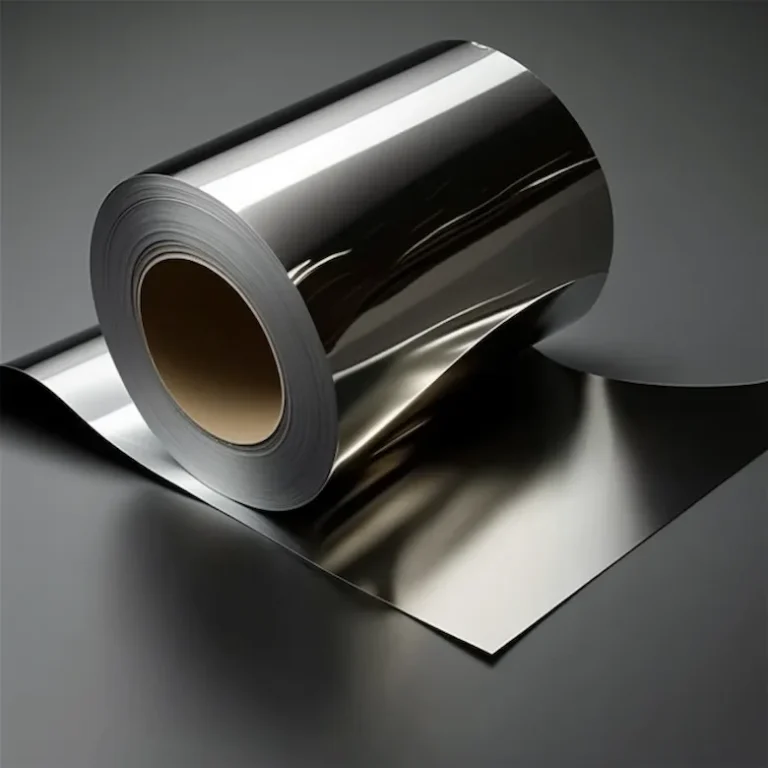
The picture tube shadow mask of color TV set used ordinary steel or non-expandable steel (INVAR, a material containing 36% Ni) a long time ago. General small TV sets use ordinary steel shadow masks, and large TV sets above 28 o’clock use inflatable steel alloy shadow masks. On the other hand, the picture tube used in the computer and the industrial monitor must use an inflatable alloy shadow mask to see still pictures or text. Non-expandable steel, because there is no Cr, is not stainless steel (that is, non-stainless steel). Because it is a high-Ni material, it is generally manufacturing in stainless steel production plants.
As special steel close to stainless steel, people added a nickel to the iron, and the linear expansion coefficient is very small if it contains 36% Ni, reflecting the characteristics. Its linear expansion coefficient is 1.2×10-6 (general steel is 11.7 x10-6), SUS304 (18Cr-8Ni) is 16.4×10-6. We can see that INVAR alloy has the advantage of not being easy to expand and contract.
For color picture tube shadow masks, many small holes appeared on an extremely thin plate with a thickness of about 10-20μm, and one hole represents a point of the image. The picture tube is kept in a heating state when the image is displayed. As time increases, the temperature gradually increases. The picture tube shadow mask also has a thermal expansion. If people used ordinary steel shadow masks, the image is blurred. The use of INVAR alloy is due to the line [expanding]. ] The expansion coefficient is small, which ensures a clear and stable picture. The color picture tube is formed with many small holes on a skinny plate with a thickness of 10-20μm by etching. For this reason, in the steelmaking process, we strive to keep non-metallic inclusions to a minimum.
In the general cold-rolled stainless steel plate standard, the minimum plate thickness is 0.30mm, and the plate thickness of the picture tube shadow mask is about 10-20μm, which is a fragile plate. Although it is thinner than 0.05mm SUS304, Yaoyi can produce foil as thin as 0.02mm. Therefore, in the process of cold rolling, ensuring dimensional accuracy and product surface shape are very important technical issues. People believe that this work is a sign that reflects the level of comprehensive technical capabilities of stainless steel manufacturers. Also, because the INVER alloy does not contain chromium (Cr), it is easy to rust. Therefore, it is necessary to operate during the handling operation carefully, and most manufacturers use anti-rust film for surface protection.
The focus of stainless steel from ordinary steel, 0.05mm SUS304 to INVAR alloy:
(1) Low line [expansion] coefficient of expansion;
(2) Corrosion (cleanliness of steel).
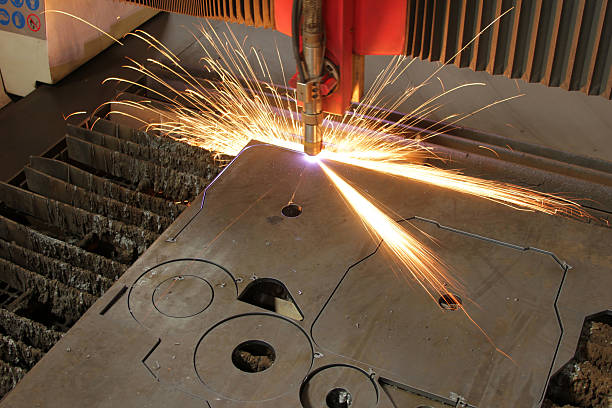
The electron gun is a device that generates electrons in the picture tube. After someone adjusted the electron beam by the converging coil and the deflection coil, it collides with the color phosphor through the shadow as mentioned earlier mask hole to emit light. Then people assembled electron guns from deep-drawn stainless steel parts. After processing, it must be non-magnetic. However, 0.05mm SUS304 (18Cr-8Ni) usually induces martensite and magnetism after the deep drawing. For this reason, 0.05 SUS30 (18Cr-8Ni) with superior austenite safety usage.
Also, the depth of small parts When deep drawing, the phenomenon of “earring” is prone to product quality problems, which workers should eliminate. Therefore, the anisotropy of the material is required to be as small as possible during deep drawing. In order to meet these characteristic requirements, stainless steel manufacturers must perform two cold rolling processes. The drawing process can significantly improve the plasticity and anisotropy through annealing treatment between two cold rollings.
(1) Non-magnetic;
(2) The anisotropy is small during deep drawing.
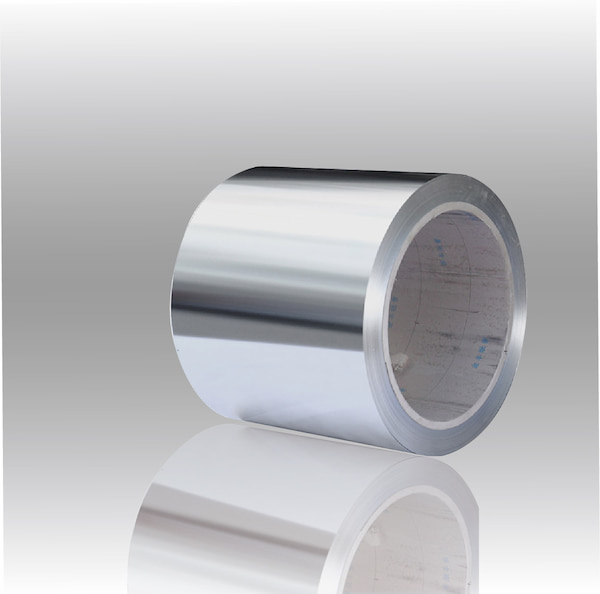
0.05mm 304 stainless steel foil is a type of thin and flexible stainless steel material with a thickness of 0.05 millimeters. It is made from 304 grade stainless steel, which is a popular and versatile austenitic stainless steel alloy. This type of foil has a smooth surface finish and can be easily bent, cut, and shaped to fit various applications.
304 stainless steel is composed of a minimum of 18% chromium and 8% nickel, with the addition of other elements such as manganese, silicon, and carbon. This combination of elements gives 304 stainless steel excellent corrosion resistance, high ductility, and good mechanical properties.
0.05mm 304 stainless steel foil is commonly used in applications that require a lightweight, strong, and corrosion-resistant material. Its high ductility also makes it suitable for applications that require forming or bending, such as in the electronics, aerospace, and medical industries.
Using 0.05mm 304 stainless steel foil in your application offers many benefits. Here are some of the most significant advantages:
High corrosion resistance: 304 stainless steel is known for its excellent corrosion resistance properties. It can withstand exposure to moisture, humidity, and corrosive substances, making it ideal for use in harsh environments.
Strength and durability: 304 stainless steel foil is strong and durable, making it an ideal material for applications that require resistance to wear and tear. It can withstand high temperatures and pressure, making it suitable for use in extreme conditions.
Versatility: 304 stainless steel foil is highly versatile and can be used in a wide range of applications. It is often used in the medical, aerospace, and electronics industries, among others.
Easy to work with: 0.05mm 304 stainless steel foil is easy to work with and can be easily cut and shaped to fit your specific application. It is also easy to weld and solder, allowing for easy integration into existing designs.
Cost-effective: Despite its many benefits, 0.05mm 304 stainless steel foil is cost-effective compared to other materials with similar properties. This makes it an excellent choice for applications that require high performance at a reasonable cost.
Overall, using 0.05mm 304 stainless steel foil in your application can provide you with a range of benefits, including durability, versatility, and cost-effectiveness. Whether you are working in the medical, aerospace, or electronics industries, 0.05mm 304 stainless steel foil is a reliable and high-performance material that can help you achieve your goals.
0.05mm 304 stainless steel foil is a versatile material that has many different applications across a range of industries. Here are some of the most common applications for this type of foil:
Electronic components: 0.05mm 304 stainless steel foil is an excellent material for manufacturing electronic components. Its high conductivity makes it ideal for use in circuit boards, while its durability and resistance to corrosion help to extend the life of the components.
Medical devices: Many medical devices require the use of thin, lightweight materials that are also strong and resistant to corrosion. 0.05mm 304 stainless steel foil meets all of these requirements, making it an ideal material for manufacturing medical devices.
Aerospace components: The aerospace industry requires materials that can withstand extreme temperatures, as well as being lightweight and durable. 0.05mm 304 stainless steel foil is an excellent material for manufacturing aerospace components, as it is both strong and lightweight, and can withstand high temperatures.
Automotive components: Many automotive components require the use of thin, lightweight materials that are also strong and resistant to corrosion. 0.05mm 304 stainless steel foil is an excellent material for manufacturing automotive components, such as fuel injectors and sensors.
Packaging: 0.05mm 304 stainless steel foil is an ideal material for packaging food and other perishable items, as it is both strong and resistant to corrosion. It can also be used for packaging other items that require a high level of protection, such as electronic components and medical devices.
Overall, the versatility and durability of 0.05mm 304 stainless steel foil make it an ideal material for use in a wide range of applications across many different industries.
Compared to other thicknesses of stainless steel foil, 0.05mm 304 stainless steel foil has its unique properties and advantages.
Firstly, it is thinner and lighter than thicker foils, making it easier to work with and more versatile in its applications. This can be particularly useful in applications where weight and space are at a premium.
Secondly, 0.05mm 304 stainless steel foil has good corrosion resistance and durability, which is common to all thicknesses of 304 stainless steel foil. However, the thinner foil may offer better flexibility and formability, which can be important in certain applications.
Thirdly, the thinner foil may be better suited to applications that require higher precision or tighter tolerances. This is because the thinner foil can be more easily shaped and manipulated to meet specific requirements.
In comparison to other thicknesses, such as 0.02mm or 0.03mm, 0.05mm 304 stainless steel foil may offer improved strength and durability, as it is slightly thicker. However, it may not be as lightweight or flexible as the thinner foils.
It is important to consider the specific needs of your application when choosing the appropriate thickness of stainless steel foil. If you are unsure which thickness is best suited for your needs, consult with a reputable manufacturer or supplier like Yaoyi to determine the optimal solution.
Yes, 0.05mm 304 stainless steel foil is magnetic. This is because 304 stainless steel is an austenitic stainless steel, which means it contains high levels of nickel and chromium. These elements help to make 304 stainless steel highly corrosion-resistant and also give it its magnetic properties. The magnetic properties of 304 stainless steel foil can be advantageous in certain applications, such as in the production of magnetic sensors or when working with magnetic fields. However, it is important to note that the magnetic properties of 304 stainless steel foil may not be suitable for all applications and should be carefully considered when selecting the appropriate thickness for a specific application.
Yes, Yaoyi Stainless Steel offers customization services for 0.05mm 304 stainless steel foil to fit your specific needs. We understand that every application has unique requirements, and we are committed to providing our customers with tailored solutions.
Our team of experts will work closely with you to understand your application and recommend the appropriate thickness, width, and length of 0.05mm 304 stainless steel foil. We can also customize the surface finish and hardness of the foil to meet your specific requirements.
We use advanced equipment and techniques to ensure that our customized 0.05mm 304 stainless steel foil meets the highest quality standards. Our quality management system, registered as ISO 9001:2015, guarantees that our products meet the strictest industry standards.
Whether you need a small or large quantity, we are committed to delivering your customized 0.05mm 304 stainless steel foil on time and within budget. Contact us today to discuss your specific needs and let us help you find the perfect solution for your application.
304 and 316 stainless steel foils are two of the most commonly used grades of stainless steel in various industries. While both are highly corrosion-resistant and durable, there are some key differences between the two that make them suitable for different applications.
The main difference between 304 and 316 stainless steel is their composition. 304 stainless steel contains 18% chromium and 8% nickel, while 316 stainless steel contains 16% chromium, 10% nickel, and 2% molybdenum. This added molybdenum makes 316 stainless steel more resistant to corrosion, particularly in harsher environments such as marine applications.
In terms of physical properties, 316 stainless steel is slightly stronger and more ductile than 304 stainless steel. It also has a higher melting point and can withstand higher temperatures without becoming brittle.
When it comes to cost, 316 stainless steel is generally more expensive than 304 stainless steel. However, the added durability and corrosion resistance may be worth the investment for certain applications.
In terms of their use in foil form, both 304 and 316 stainless steel are available in various thicknesses, including 0.05mm. The choice between the two will depend on the specific requirements of the application, including the level of corrosion resistance needed and the environment in which the foil will be used.
When it comes to selecting the right thickness of 0.05mm 304 stainless steel foil for your application, there are a number of factors to consider. Here are some of the most important ones:
Strength and durability: If your application requires a material that is strong and durable, you will want to select a thicker foil. This is because thicker foils are less likely to deform or break under stress.
Flexibility: On the other hand, if your application requires a material that is flexible and can be easily bent or shaped, a thinner foil may be more appropriate. Thinner foils are generally more pliable and easier to work with than thicker ones.
Heat resistance: If your application involves exposure to high temperatures, you will want to choose a foil that is thick enough to withstand the heat. Thicker foils can generally handle higher temperatures without melting or warping.
Corrosion resistance: Stainless steel is known for its corrosion-resistant properties, but different grades of stainless steel have different levels of resistance. If your application involves exposure to corrosive substances, you may need to choose a thicker foil or a different grade of stainless steel to ensure adequate protection.
Cost: Thicker foils generally cost more than thinner ones, so you will need to consider your budget when selecting the appropriate thickness for your application.
By considering these factors and working with a knowledgeable supplier, you can choose the ideal thickness of 0.05mm 304 stainless steel foil for your specific needs.
0.02mm stainless steel is highly used in the medical field. The high precision required in medical instruments is achievable with this thickness.
It's popular in the automotive industry. 0.02mm stainless steel provides strength and flexibility for various parts.
Precision electronics require thin materials like 0.02mm Thickness 304 Stainless Steel, making it ideal for components.
In aerospace, weight and strength are vital. 0.02mm stainless steel fits these requirements perfectly.
For modern kitchen appliances, 0.02mm stainless steel provides an aesthetic and functional appeal.
The packaging sector also uses this steel for various products, ensuring durability and finesse.
Quality standards like ISO 9001 are essential for ensuring 0.02mm stainless steel's top quality.
Availability in various alloys and forms allows its use in diverse applications.
Here's what gauge is 1mm stainless steel. A guide for buying the right thickness is vital for choosing the 0.02mm stainless steel for specific needs.
The applications of 0.02mm stainless steel are vast, ranging from medical to automotive. Its quality and precision make it a preferred choice in many industries.
Starting with top-quality hot-rolled coils from Baosteel, the selection of raw materials plays a crucial role in the quality of 0.02mm Thickness 304 Stainless Steel.
The stainless steel foil is made by hot-rolling the selected coils, setting the initial thickness.
Through a precise CNC system, the thickness tolerance is controlled within 0.005mm, ensuring the final 0.02mm thickness.
With a spectrometer imported from Germany, the exact chemical composition is analyzed, aligning with international standards.
Adhering to ISO 9001 standards, Yaoyi ensures consistent quality in every batch of 0.02mm stainless steel.
Different forms, such as 0.02mm Thickness 304 Stainless Steel Shim Foil, are cut and shaped as required.
Depending on the application, surface treatments are applied to enhance properties like corrosion resistance.
Advanced laboratory equipment is utilized to test hardness, elongation, and other mechanical properties.
Yaoyi’s careful packaging and delivery process ensures that the quality of the product is maintained until it reaches the customer.
The production of 0.02mm stainless steel is a complex process that demands precision and quality control. Yaoyi Stainless Steel’s modern techniques guarantee the best product for its customers.
0.02mm stainless steel is considered ultra-thin, providing unique characteristics compared to thicker options.
Thinner gauges like 0.02mm stainless steel are used in precision applications, whereas thicker ones are employed in more structural applications.
The balance between strength and flexibility varies with thickness. 0.02mm stainless steel offers more flexibility.
Prices differ based on thickness, with 0.02mm Thickness 304 Stainless Steel having specific pricing dynamics.
Thinner materials like 0.02mm stainless steel may require specialized suppliers like Yaoyi Stainless Steel.
The ability to customize 0.02mm stainless steel is higher, allowing for unique applications.
Specialized quality control, like the 0.005mm tolerance at Yaoyi, is essential for ultra-thin gauges.
Thinner materials like 0.02mm Thickness 304 Stainless Steel Shim Foil may offer environmental benefits in certain applications.
The choice between 0.02mm stainless steel and other thicknesses depends on various factors, including application needs, strength, flexibility, and price. Understanding these differences aids in making informed decisions.
0.02mm stainless steel is available in various alloys, including 304, 316, and more, to suit different applications.
Known for its excellent corrosion resistance, 0.02mm Thickness 304 Stainless Steel is widely used in various industries.
With added molybdenum, this alloy provides higher corrosion resistance, suitable for marine applications.
Some suppliers, like Yaoyi, can provide customized alloys tailored to specific requirements.
Choosing the right alloy depends on factors like strength, corrosion resistance, and application needs. Knowing what gauge is 1mm stainless steel, and other thickness-related information helps in selection.
Trusted suppliers provide detailed guidance on selecting the right alloy for your 0.02mm stainless steel needs.
Different alloys may have varied pricing. Understanding the cost implications aids in budget planning.
Top suppliers offer quality assurance on all alloys, ensuring they meet the required standards and specifications.
Some alloys are more environmentally friendly, offering sustainable options for those looking to minimize their ecological footprint.
With various alloy options, 0.02mm stainless steel can meet diverse requirements. Whether corrosion resistance or strength, the right alloy ensures optimal performance and durability.
Yaoyi Stainless Steel operates under the ISO 9001 quality management system, ensuring high standards for 0.02mm stainless steel.
Using a CNC system, Yaoyi controls the thickness tolerance within 0.005mm for all 0.02mm stainless steel products.
Advanced spectrometry technology is used to accurately analyze the chemical composition of 0.02mm Thickness 304 Stainless Steel.
Yaoyi’s laboratory equipment tests each batch for hardness, elongation, and other essential properties, maintaining quality.
Every batch undergoes strict quality control, ensuring consistency across all 0.02mm stainless steel products.
Yaoyi offers free testing for customers, providing transparency and confidence in the product quality.
Yaoyi also adheres to environmental standards, ensuring responsible production of 0.02mm stainless steel.
Utilizing hot-rolled coils from Baosteel, Yaoyi guarantees quality from the source, ensuring reliable 0.02mm stainless steel products.
Quality is paramount at Yaoyi Stainless Steel, with rigorous standards and modern techniques ensuring the highest quality 0.02mm stainless steel. From thickness tolerance to chemical composition, customers can trust Yaoyi’s commitment to excellence.
0.02mm stainless steel is utilized for surgical instruments, dental tools, and other precise medical applications.
With its thin profile, it is employed in various electronic components, contributing to the miniaturization trend.
Used in gaskets, shims, and other components, 0.02mm stainless steel provides strength and precision in automotive applications.
In the aerospace sector, the precise tolerance and durability of 0.02mm stainless steel make it essential for critical parts.
Its malleability and aesthetic appeal make 0.02mm Thickness 304 Stainless Steel popular in intricate jewelry designs.
The food-safe nature of 0.02mm stainless steel makes it a choice material for machinery and utensils in food processing.
In construction, it’s used for decorative elements, providing a sleek finish and corrosion resistance.
0.02mm stainless steel can be found in solar panels and other renewable energy applications, offering both strength and flexibility.
The versatility of 0.02mm stainless steel allows for custom applications across various other industries.
The use of 0.02mm stainless steel spans multiple industries, from medical to renewable energy. Its unique characteristics make it a valuable material for a wide range of applications.
The price of 0.02mm Thickness 304 Stainless Steel Shim Foil varies based on factors like alloy, quantity, and supplier.
Different alloys, such as 304 and 316, may have different pricing, affecting the overall cost of the stainless steel hollow tube sizes and other forms.
Buying in bulk may result in discounts, reducing the overall cost per unit of 0.02mm stainless steel.
Different suppliers may offer varied pricing based on quality, location, and other factors.
High-quality products like those from Yaoyi may command a premium price, given the stringent quality control.
Customized forms of 0.02mm stainless steel may have additional costs due to unique specifications.
Shipping costs, packaging, and handling can also affect the final price of 0.02mm Thickness 304 Stainless Steel Shim Foil.
The price range for 0.02mm stainless steel can vary widely. Considering factors like alloy, quantity, quality, and supplier can help you find the right product at the right price.
The 0.02mm thickness provides specific tensile strength and elasticity, suitable for certain applications like shims and gaskets.
A thickness of 0.02mm enables greater flexibility and malleability, allowing intricate designs in jewelry and electronics.
The 0.02mm thickness contributes to the lightweight nature, essential in aerospace and automotive industries.
Thickness may affect the corrosion resistance, with 0.02mm stainless steel maintaining good resistance in most applications.
The 0.02mm thickness affects thermal properties, which can be a consideration in industrial applications.
Various surface finishes are available for 0.02mm Thickness 304 Stainless Steel, affecting appearance and functionality.
Thickness directly affects the material cost, with 0.02mm stainless steel offering an economical option for specific needs.
Thinner materials like 0.02mm stainless steel may have lower environmental impacts during production and recycling.
Understanding what gauge is 1mm thick stainless steel and other thicknesses helps in selecting the right material for specific applications.
The thickness of 0.02mm influences various properties of stainless steel, from strength to cost. Selecting the right thickness is vital for optimal performance in various applications.
Investigating the reputation and reviews of suppliers ensures quality and reliability for 0.02mm stainless steel purchases.
Suppliers like Yaoyi who adhere to ISO 9001 and other quality standards guarantee consistency and excellence in 0.02mm stainless steel.
Evaluating prices across suppliers helps find the right balance between cost and quality for 0.02mm Thickness 304 Stainless Steel Shim Foil.
Finding suppliers that offer customization ensures that your specific requirements for 0.02mm stainless steel are met.
Consideration of shipping, delivery times, and customer support enhances the purchasing experience.
Suppliers with environmental standards showcase responsible practices in producing 0.02mm stainless steel.
Suppliers offering samples allow testing and evaluation before committing to larger purchases of 0.02mm stainless steel.
Choosing the right supplier for 0.02mm Thickness 304 Stainless Steel Shim Foil involves considering reputation, quality, price, customization, and support. Careful evaluation ensures a successful purchase.